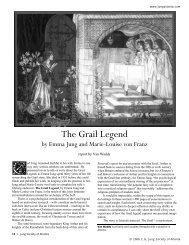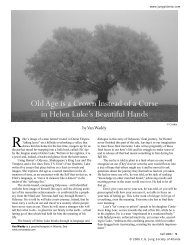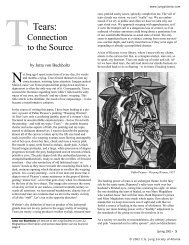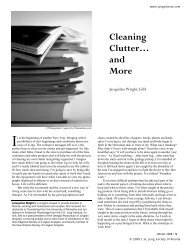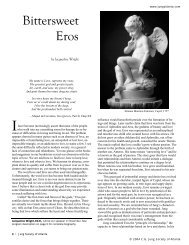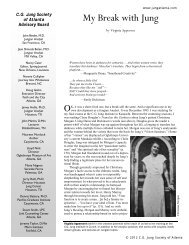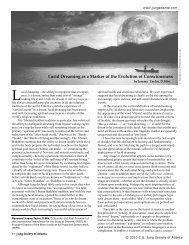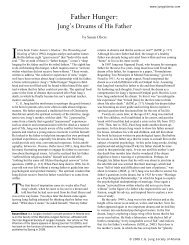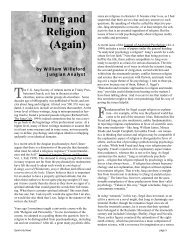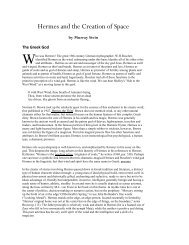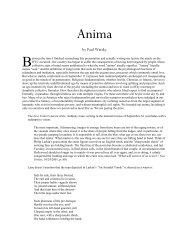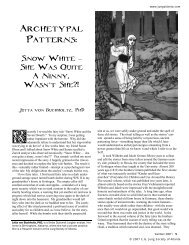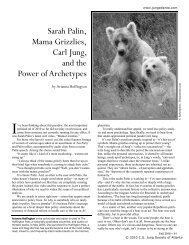Decoding Hillman - C.G. Jung Society of Atlanta
Decoding Hillman - C.G. Jung Society of Atlanta
Decoding Hillman - C.G. Jung Society of Atlanta
Create successful ePaper yourself
Turn your PDF publications into a flip-book with our unique Google optimized e-Paper software.
DECODING<br />
<strong>Hillman</strong><br />
A Critical Look at the Author<br />
<strong>of</strong> the Soul’s Code.<br />
Cliff Bostock<br />
hen James <strong>Hillman</strong> appeared before the <strong>Atlanta</strong> <strong>Jung</strong><br />
W <strong>Society</strong> a few years ago, his strongest impression on<br />
many <strong>of</strong> us had little to do with his reading from his<br />
best seller <strong>of</strong> the time, The Force <strong>of</strong> Character.<br />
Instead, we were most struck by the virtual tantrum he pitched,<br />
demanding that a <strong>Society</strong> member stop snapping pictures <strong>of</strong><br />
him for the newsletter. I couldn’t avoid noticing the multiple<br />
layers <strong>of</strong> irony in <strong>Hillman</strong>’s tantrum. As he acknowledged himself<br />
after he cooled down, he was well demonstrating the<br />
“heightened irritability” <strong>of</strong> the elderly cited in his book.<br />
More important and ironic, though, was the way <strong>Hillman</strong>’s<br />
angry explosion expressed the full measure and difficulty <strong>of</strong> his<br />
archetypal psychology. Like <strong>Jung</strong>, <strong>Hillman</strong> believes that image<br />
is psyche. "The soul is constituted <strong>of</strong> images… the soul is primarily<br />
an imagining activity," he writes in Archetypal Psychology:<br />
A Brief Account. Thus it’s no great stretch to say that,<br />
from <strong>Hillman</strong>’s perspective, the photographer was playing the<br />
anthropologist attempting to capture the soul <strong>of</strong> a shaman in his<br />
camera. “It’s my image!” <strong>Hillman</strong> shouted.<br />
And that claim, while expressing the primacy <strong>of</strong> the image,<br />
also discloses the difficulty <strong>of</strong> archetypal psychology. For <strong>Hillman</strong><br />
maintains repeatedly that images have autonomy. They<br />
are the spontaneous production <strong>of</strong> the soul. Indeed, for him,<br />
psychotherapy itself is on behalf <strong>of</strong> the image, not on behalf <strong>of</strong><br />
the self. So, while one can argue that photography inhibits the<br />
essential movement <strong>of</strong> an image by freezing it, the fact is that<br />
<strong>Hillman</strong>, logician <strong>of</strong> the soul, attempted vainly (in all senses <strong>of</strong><br />
the word) to control exhibition <strong>of</strong> the image that, in his terms,<br />
dreams him.<br />
This points in a symptomatic way – if a tantrum can be called a<br />
Cliff Bostock, M.A., is a doctoral candidate in depth psychology at<br />
Pacifica Graduate Institute. He conducts workshops and individual<br />
sessions he calls “soulwork,” as an alternative to psychotherapy.<br />
www.jungatlanta.com<br />
symptom -- to the underlying problem <strong>of</strong> archetypal psychology,<br />
in my view. By taking its own metaphors too literally --<br />
by “literalizing the process <strong>of</strong> deliteralizing,” to use Catherine<br />
Keller’s critical phrase -- it <strong>of</strong>ten sabotages itself.<br />
efore I explain that more fully, let me first outline in very<br />
B simplified terms some <strong>of</strong> the reasons I revere <strong>Hillman</strong>’s<br />
thinking, which basically amount to the important ways he<br />
departed from <strong>Jung</strong>. The primary one is his rejection <strong>of</strong> monotheism.<br />
<strong>Jung</strong>, <strong>of</strong> course, was heavily influenced by Christianity,<br />
and his psychology imagines the human evolving in a Christlike<br />
way to what he calls the individuated Self, a kind <strong>of</strong> umbrella<br />
archetype under which our warring interior drives can be<br />
brought into dialogue and resolution. Thus the <strong>Jung</strong>ian holds<br />
any pair <strong>of</strong> opposites in tension for the sake <strong>of</strong> constellating a<br />
third possibility. <strong>Jung</strong> is always pushing us to wholeness and<br />
integration – the “oneness” to which monotheism inevitably<br />
aspires.<br />
<strong>Hillman</strong> instead draws his inspiration from the Greeks and advocates<br />
a polytheistic psychology. He effectively abandons the<br />
idea that we have a central Self. Instead, he argues, the psyche<br />
is inevitably plural – comprised <strong>of</strong> different beings, personified<br />
as the gods in the ancient pantheon. He doesn’t purchase<br />
the idea that monotheism (or individuation) represents an evolutionary<br />
improvement over polytheism (or psychic plurality).<br />
In destabilizing the Self, <strong>Hillman</strong> is thoroughly postmodern<br />
and <strong>of</strong> course accused <strong>of</strong> nihilism. What kind <strong>of</strong> life can we<br />
have without imagining ourselves as whole, evolving beings<br />
with access to universal truths if only we devote ourselves to<br />
Winter 2002 • 7<br />
© 2002 C.G. <strong>Jung</strong> <strong>Society</strong> <strong>of</strong> <strong>Atlanta</strong>
the task?<br />
For <strong>Hillman</strong> the answer is in aesthetics. He insists that the soul,<br />
as producer <strong>of</strong> images, wants nothing more than beauty. <strong>Hillman</strong>’s<br />
beauty is not “pretty” but that which arrests our attention.<br />
This follows because, he says, the fundamental quality <strong>of</strong><br />
images is their movement. We are in the presence <strong>of</strong> beauty<br />
when our attention is stopped. Beauty is awe.<br />
For <strong>Hillman</strong> it is enough to continually deepen one’s sense <strong>of</strong><br />
life’s beauty. This is soulmaking. We should not confuse the<br />
soul with the Self. The soul seeks and expresses difference. It<br />
delights in multiplicity. It confers meaning by processing images<br />
and, most important, it is not “inside” us. It is an "other."<br />
It is with us. It is connected to the soul <strong>of</strong> the world, but it is<br />
most definitely not “us.” In <strong>Hillman</strong>’s world, we live as poets,<br />
not as Christs-in-training.<br />
I find this approach to psychology deeply satisfying. Archetypal<br />
psychology recognizes the thirst for “wholeness” as legitimate<br />
but refuses to valorize it above all others. In archetypal<br />
psychology, every unpleasant experience does not become<br />
another battle. Every time Aphrodite causes us to throw<br />
our brains out the window or Hermes seizes our tongue and<br />
makes contrarians <strong>of</strong> us, we don’t have to pathologize ourselves<br />
as split-<strong>of</strong>f. We can instead, like Lester in the film<br />
American Beauty, look on the spectacle <strong>of</strong> our naturally fractured<br />
lives with awe and compassion. We learn, in <strong>Hillman</strong>’s<br />
terms to “see through” but not transcend.<br />
his approach certainly isn’t for everyone. It disrespects<br />
T bliss and it is haunted by structural contradictions that<br />
can’t be dismissed as interesting paradoxes. The most obvious<br />
is that while <strong>Hillman</strong> abandons metanarratives <strong>of</strong> wholeness,<br />
he seems to fully purchase others, like the world soul. Still, in<br />
the way he calls himself a bricoleur, I am happy to align myself<br />
with <strong>Hillman</strong>’s notion <strong>of</strong> the soul as a process by which<br />
life gains beauty in difference rather than with the more traditional<br />
<strong>Jung</strong>ian notion <strong>of</strong> the Self as an integrative process <strong>of</strong><br />
wholeness.<br />
But <strong>Hillman</strong> does break down in some significant ways. I began<br />
to realize this when my doctoral dissertation led me to<br />
questions <strong>of</strong> gender and sexual orientation – two discourses<br />
that have not been well examined by <strong>Jung</strong>ian or post-<strong>Jung</strong>ian<br />
thinkers. (An exception is Andrew Samuels.) In fact, <strong>Hillman</strong><br />
has repeatedly refused to discuss gender for precisely the same<br />
reasons the postmodern discourses have felt it necessary.<br />
“I follow old Alfred Adler in considering all oppositional<br />
thinking to be a neurotic mental activity,” he writes in the Utne<br />
Reader. “The male-female opposition was for him the most<br />
basic <strong>of</strong> the polar pairs, and hence the most neurotic. Gender is<br />
a class concept, dividing the populace <strong>of</strong> the world into some<br />
three billion folks amassed on either side <strong>of</strong> a barbed conceptual<br />
fence.”<br />
This is superficially an agreeable position from my perspective.<br />
(For one thing it points to another departure from <strong>Jung</strong>,<br />
8 • <strong>Jung</strong> <strong>Society</strong> <strong>of</strong> <strong>Atlanta</strong><br />
www.jungatlanta.com<br />
since it ultimately disputes the necessarily contrasexual nature<br />
<strong>of</strong> the anima.) However, even Derrida, whose deconstructionist<br />
position is identical to <strong>Hillman</strong>’s in this context, recognizes the<br />
necessity <strong>of</strong> engaging opposites in not merely a dialogue, as<br />
<strong>Jung</strong> would, but in a discursive reversal <strong>of</strong> value, so that, in<br />
this case, female would be privileged above male. Interestingly,<br />
early in his career, <strong>Hillman</strong> did exactly that, <strong>of</strong>ten writing<br />
that psychology needs to “recover” from masculinity and<br />
install the feminine.<br />
In a sense that’s what <strong>Hillman</strong> did by placing “anima mundi,”<br />
soul <strong>of</strong> the world, as a feminine principle at the center <strong>of</strong> his<br />
psychology. However, and here I get to the point with which I<br />
opened this essay, this principle becomes a densely concrete<br />
metaphor <strong>of</strong> feminine consciousness that borders on the New<br />
Age. In an essay in Post-<strong>Jung</strong>ians Today, David Tacey compares<br />
<strong>Hillman</strong>’s situation to <strong>Jung</strong>’s description (in Symbols <strong>of</strong><br />
Transformation) <strong>of</strong> a particular mother complex dominated by<br />
the “virgin anima…turned toward the inner sun.”<br />
The interesting result <strong>of</strong> this is most evident in <strong>Hillman</strong>’s own<br />
life. While disputing the need to even discuss gender and installing<br />
his own mother complex at the center <strong>of</strong> his psychology,<br />
he became deeply involved with Robert Bly’s “men’s<br />
movement” during the last decade. That movement, guided by<br />
images <strong>of</strong> “Iron John,” explicitly enjoins men to reclaim what<br />
it has supposedly lost to women – to feminism and the cult <strong>of</strong><br />
the mother. I don’t need to explain what underlies the bizarre<br />
reification <strong>of</strong> stereotyped genders by the same man who says<br />
gender is irrelevant. We have <strong>Hillman</strong>’s own words in The<br />
Myth <strong>of</strong> Analysis, cited by Tacey,: “Assertive masculinity is<br />
© 2002 C.G. <strong>Jung</strong> <strong>Society</strong> <strong>of</strong> <strong>Atlanta</strong>
suspicious. Somewhere we know that it must be reactive to<br />
feminine attachment.”<br />
This habit <strong>of</strong> concretizing, literalizing his own metaphors, like<br />
“soul <strong>of</strong> the world,” sabotages much <strong>of</strong> <strong>Hillman</strong>’s work. In the<br />
same way he concretizes his personal image and ends up in a<br />
tantrum <strong>of</strong> possessiveness, he literalizes the soul <strong>of</strong> the world<br />
as a nostalgic virgin mother and, overcome by his own attachment,<br />
he concretizes the male as a tantrum-throwing Iron John.<br />
The same thing occurs in his reading <strong>of</strong> the Persephone myth,<br />
where he utterly refuses to see the abduction <strong>of</strong> Demeter’s<br />
daughter as in part a comment on women’s condition in a patriarchal<br />
society. Instead, he literalizes it as his own metaphor <strong>of</strong><br />
soulmaking, at the cost <strong>of</strong> acknowledging women’s real-world<br />
suffering. In other words, he identifies with Hades and perpetuates<br />
the very masculine domination <strong>of</strong> psychology he recanted<br />
earlier.<br />
Where does this leave an admirer <strong>of</strong> <strong>Hillman</strong>’s psychology?<br />
The temptation is to say that his radical, self-contradictory split<br />
is exactly the result <strong>of</strong> not holding the opposites with more<br />
conscious intention. Thus one could, like Tacey, prescribe a<br />
return to <strong>Jung</strong>. But I’m not so sure. <strong>Jung</strong>, as every <strong>Jung</strong>ian<br />
knows, suffered similarly.<br />
But how to adopt polytheism and turn from the notion <strong>of</strong> the<br />
organizing, monotheistic Self without becoming overwhelmed<br />
by the voices within? I think archetypal psychology needs to<br />
attempt a more conscious rapprochement with feminist and<br />
other postmodern discourses. In my own work, I insist that<br />
whatever is present be reversed, in a kind <strong>of</strong> therapeutics based<br />
on Derrida’s notion <strong>of</strong> play. This subtraction and exchange <strong>of</strong><br />
value is not unlike some varieties <strong>of</strong> Buddhism, whose object<br />
is “nothingness,” which is not nihilistic but sublime. In this<br />
way, we might say that Hermes or Dionysos consciousness<br />
becomes our guide, rather than the Self. I believe, really, this is<br />
what <strong>Hillman</strong> intends but, for all manner <strong>of</strong> reasons, including<br />
his attachment to Platonic thinking, he can’t quite bear to<br />
maintain. That is left for the next generation <strong>of</strong> archetypal psychologists<br />
■<br />
www.jungatlanta.com<br />
Winter 2002 • 9<br />
© 2002 C.G. <strong>Jung</strong> <strong>Society</strong> <strong>of</strong> <strong>Atlanta</strong>



